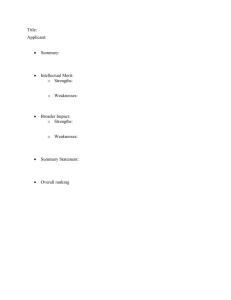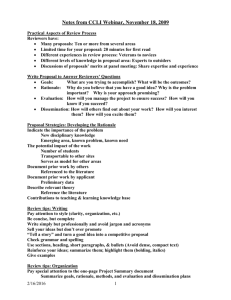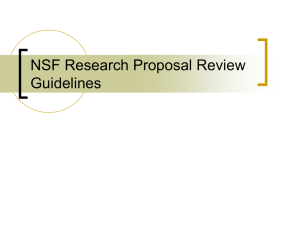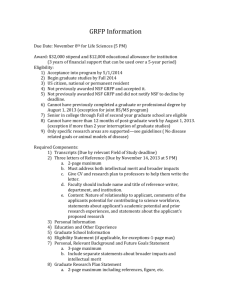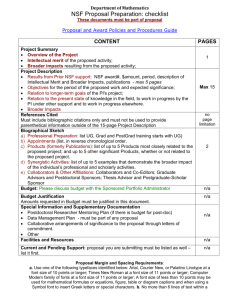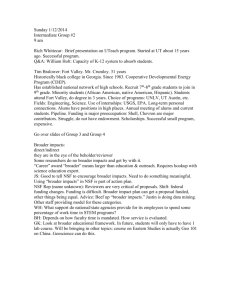Integral to Excellence in STEM
advertisement
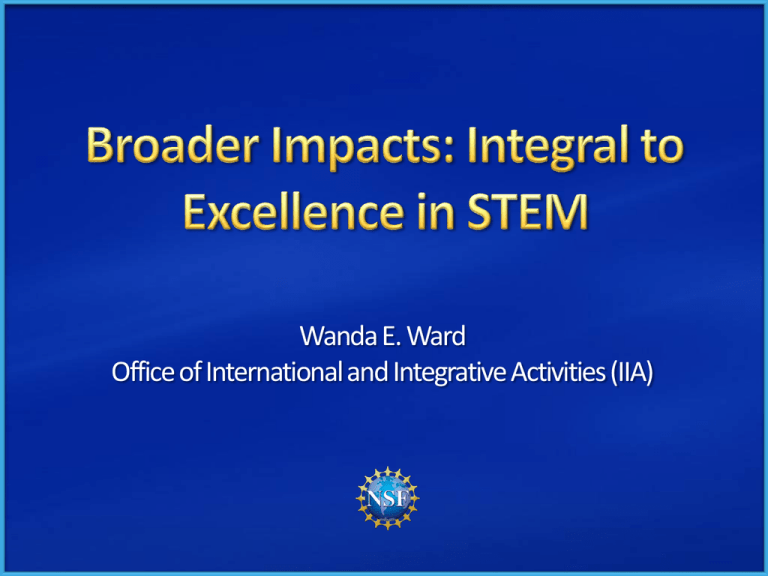
Wanda E. Ward Office of International and Integrative Activities (IIA) CONTEXT Mission …to promote the progress of science; to advance the national health, prosperity, and welfare; to secure the national defense… Strategic Goals Transform the frontiers of science and engineering Stimulate innovation and address societal needs through research and education Excel as a federal science agency Scientific Excellence Organizational Excellence Learning Inclusiveness Accountability for Public Benefit MERIT REVIEW OVERVIEW Intellectual Merit: The Intellectual Merit criterion encompasses the potential to advance knowledge; and Broader Impacts: The Broader Impacts criterion encompasses the potential to benefit society and contribute to the achievement of specific, desired societal outcomes. Merit Review FAQs: http://www.nsf.gov/bfa/dias/policy/merit_review/mrfaqs.jsp The following elements should be considered in the review for both criteria: 1. What is the potential for the proposed activity to: a. Advance knowledge and understanding within its own field or across different fields (Intellectual Merit); and b. Benefit society or advance desired societal outcomes (Broader Impacts)? 2. To what extent do the proposed activities suggest and explore creative, original, or potentially transformative concepts? 3. Is the plan for carrying out the proposed activities well-reasoned, wellorganized, and based on a sound rationale? Does the plan incorporate a mechanism to assess success? 4. How well qualified is the individual, team, or organization to conduct the proposed activities? 5. Are there adequate resources available to the PI (either at the home organization or through collaborations) to carry out the proposed activities? K-12 engagement Broadening participation Training of graduate students Training of postdocs International connections Integration of undergraduate research and education Development of research infrastructure Development of researchbased educational materials EPSCoR considerations Research experiences for teachers Technology transfer Mentoring Collaborations across disciplines Use of media to educate public in STEM Museum exhibits Connections with industry Impacts on human health Environmental impacts Impacts on animal health Security of cyberspace Informing of national priorities/ initiatives Translation from theory to practice Other societal benefits EXISTING EFFORTS AT NSF Changes to the Proposal Process Project Summary will contain the following required separate statements o Overview of the Project o Statement on Intellectual Merit o Statement on Broader Impacts Project Description must contain a separate section with a discussion of the Broader Impacts Proposing organizations must certify that organizational support will be made available as described in the proposal to address the Broader Impacts and Intellectual Merit activities. Annual and Final Reports must address activities related to the Broader Impacts criterion that are not intrinsic to the research. Source: http://www.nsf.gov/bfa/dias/policy/merit_review/factsheets/proposers.pdf Core Strategies “NSF’s mission is particularly well-implemented through the integration of research and education and broadening participation in NSFprograms, projects, and activities.” Synergistic Activities “A list of up to five examples that demonstrate the broader impact of the individual’s professional and scholarly activities that focuses on the integration and transfer of knowledge as well as its creation.” Survey panelists about BI during panels o Identify areas of BI most important to the community o Identify best practices and most effective approaches Investigate annual reports (focus on undergraduate education) o Summer interns and AAAS Fellow checked past reports o Working to identify the impacts of BI Outreach to PIs o Trying to build a cohort of junior investigators in both GEO research and GEO science education experts Inreach to PIs o Plan webinars, etc. Discussion with ERE AC Funded the Center for Advancement of Informal Science Education (CAISE) to develop a webbased resource on Broader Impacts/Informal Science Education Funded University Corporation for Atmospheric Research (UCAR) to facilitate the flow of information and communications across the NSDL community to build community capacity to exploit opportunities collectively to address Broader Impacts Components of Broader Impacts o Education and Outreach o Diversity o Knowledge Transfer Science: Becoming the Messenger Workshops Principal investigators, early career researchers and engineers, graduate students, postdocs, and public information officers who would like to learn more about communicating science to news media and the general public. Provides one-stop shopping for those seeking to reach a broader public about their work. Over the course of this full day training, participants will learn how to craft a message and deliver it to a variety of media outlets. They will have the opportunity to experience live interview training, to develop writing and new media skills, to hone their public presentations, and even to produce video. For the ambitious researchers specially selected to participate for a second half day, their messages will be developed further and translated into an appropriate medium to be taken public. Some scientists will leave the workshop with publishable blog posts, op-eds, YouTube videos--and more. This project is supported by the National Science Foundation (under #CNS1033413). http://toilers.mines.edu/CISEBI/ BROADER IMPACTS AS RESEARCH “Broader impacts may be accomplished through the research itself, through the activities that are directly related to specific research projects, or through activities that are supported by, but are complementary to the project.” 2013 PAPP Guide Cyber-enable CEMMSS Cybersecurity Cyberinfrastructure SaTC CIF21 Innovation Sustainability SEES I-Corps Cognitive Science and Neuroscience BRAIN To improve understanding of the brain will promote brain health; enable engineered solutions that enhance, replace, or compensate for lost function; improve the effectiveness of formal and informal educational approaches; and lead to braininspired smarter technologies for improved quality of life. To increase understanding of the integrated system of supply chains, society, the natural world, and the alternations humans bring to Earth, in order to create a sustainable world. To integrate a number of science and engineering activities across the Foundation – breakthrough materials, advanced manufacturing, robotics, and cyber-physical systems to address pressing technological challenges facing the Nation and promote U.S. manufacturing competiveness. To accelerate and transform the process of scientific discovery and innovation by providing advanced cyberinfrastructure and new capabilities in computational and data-enabled science and engineering (CDS&E). To improve access by NSFfunded researchers to resource that can assist: (a) In bridging the gap between discoveries and downstream technological applications, and (b) In building and sustaining a national ecosystem that support the development of technologies, products, and processes that benefit the Nation. To build the knowledge base in cybersecurity that enables discovery, learning and innovation, and leads to a more secure and trustworthy cyberspace. MORE EXAMPLES Partnerships for Innovation (PFI) Small Business Innovation Research Program (SBIR) Small Business Technology Transfer Program (STIR) Industry & University Cooperative Research Program (I/UCRC) Science of Broadening Participation Examples: Informed by and building on existing social and behavioral science theories . Inherently interdisciplinary by fostering collaboration between SBE scientists and those in the natural and physical sciences engaged BP efforts. Methodologically rigorous research that employs a variety of empirical approaches and methods. Potentially transformative (i.e., disruptive of existing paradigms). Source: Adapted from Kelli Craig Henderson, September, 2013 Interdisciplinary and Inclusion Focus of ERE AC “If women and minorities are indeed more attracted to interdisciplinary research, strategically combining diversity and interdisciplinarity may yield greater benefits than addressing each issue alone, for example: Institutions interested in increasing their diversity might have a greater chance for success if they value interdisciplinary scholarship. Institutions interested in increasing interdisciplinary research may have a greater chance for success if they create environments hospitable for women and minorities.” Source: Women, Minorities, and Interdisciplinarity: Transforming the Research Enterprise – Pfirman & Rhoten, 2007 “The emphasis on accountability …extends to your work as well.” “Think about how this work will be evaluated.” -University of Pennsylvania FUTURE OPPORTUINITIES DCL for Broader Impact Infrastructure Support Fall BI Workshop BI publication series/BI Webpage Compilation of Best Practices and Assessment Tools for BI BI Seminars at Professional Meetings Tailored BI Institutes for Stakeholders Other Thank You!
